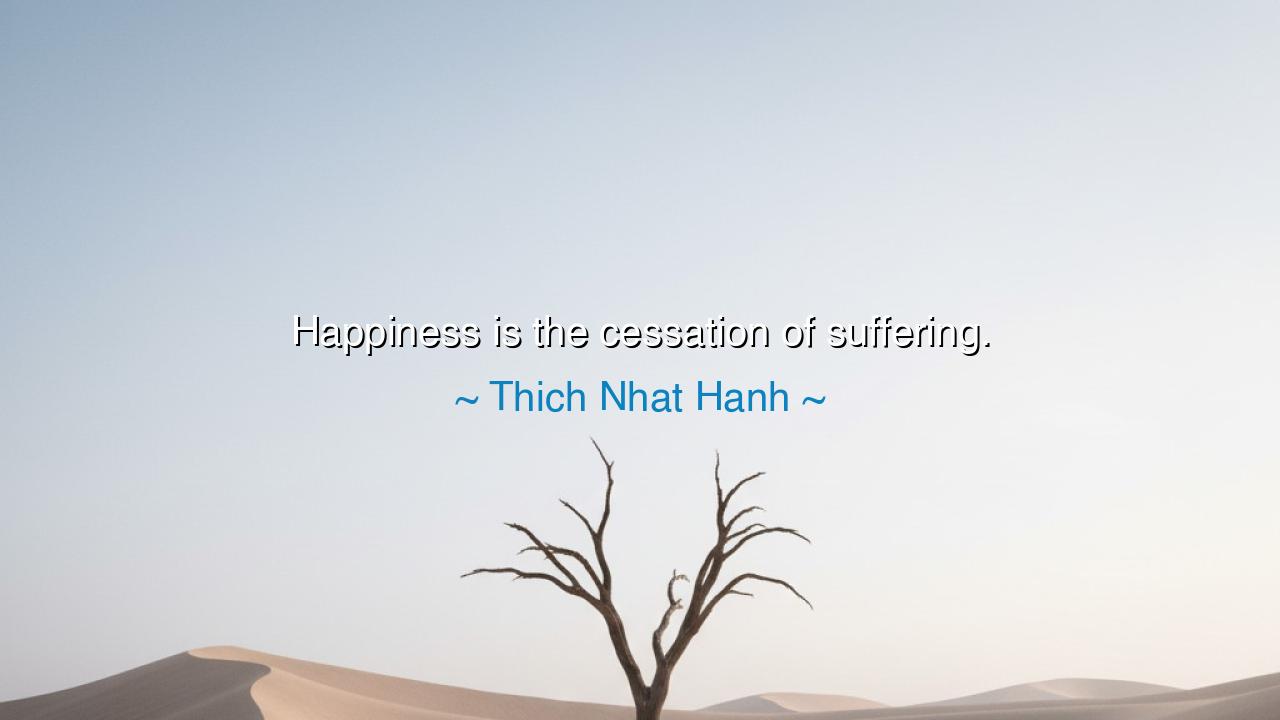
Happiness is the cessation of suffering.






The great monk and teacher of peace, Thich Nhat Hanh, once revealed a truth so simple and yet so profound: “Happiness is the cessation of suffering.” In these seven quiet words, he offers a teaching that transcends religion, nation, and age. For in the heart of every person—whether ruler or beggar, warrior or child—there burns the same desire: to be free from pain. But what he reminds us is this: happiness is not something we chase; it is what remains when suffering ends. It is not an object to be attained, but a state to be uncovered—like sunlight revealed when the clouds disperse.
The origin of this wisdom flows from the ancient wellspring of Buddhist thought, where the Buddha himself taught that all life contains suffering (dukkha), and that liberation—nirvana—is not the gaining of something new, but the ending of delusion, craving, and fear. Thich Nhat Hanh, walking in the footsteps of this truth, gave it to the modern world in words that even a child could understand. He had seen the fires of war, the pain of exile, and the sorrow of human cruelty—and from those ashes, he learned that peace cannot exist outside until it is born within. Thus, to him, happiness was not luxury, nor laughter, nor success; it was the quiet stillness that arises when one’s heart no longer burns with anger, fear, or desire.
To say that “happiness is the cessation of suffering” is to invite us to look inward, to understand that we cannot pour joy into a heart already filled with pain. The cup must first be emptied, the wound must be soothed. Just as a man drowning cannot enjoy the beauty of the sea, the mind consumed by craving cannot know peace. Thich Nhat Hanh teaches us that we must begin not by seeking joy, but by understanding our suffering—to hold it gently, as one holds a crying child, until it is quiet. For when the storm of suffering settles, what is left is not emptiness, but happiness itself, rising like dawn after a long night.
Consider, as example, the life of Nelson Mandela. For twenty-seven years, he sat behind bars, deprived of freedom, family, and home. Yet from that prison, he emerged not with bitterness, but with peace. What changed was not his circumstance, but his relationship to suffering. He learned, through patience and reflection, to let go of hatred, to cease the inner war that bound him even more than iron bars. In doing so, he found the profound joy that comes not from triumph, but from the ending of torment. His peace, like that of Thich Nhat Hanh, was not born of pleasure—it was born of release.
This truth is echoed by the ancients. The Stoic philosopher Epictetus, once a slave, said that man’s suffering lies not in things themselves but in his judgments about them. When one ceases to resist what is, suffering ends, and happiness begins. So too did the sage Lao Tzu whisper that contentment arises when desire ceases, and that the wise find joy not by adding to their possessions, but by subtracting their wants. Across time and culture, the greatest teachers have agreed: the end of suffering is not a loss, but a liberation.
What, then, does this teaching ask of us? It asks that we turn our gaze away from pursuit and toward presence. That we stop running toward happiness as though it were a distant land, and instead remove the burdens that block its path—our resentment, our greed, our comparison, our fear. It teaches us to breathe, to forgive, to accept, to let go. Every act of compassion toward ourselves and others loosens the knot of suffering a little more. And as that knot unravels, happiness flows naturally, quietly, without effort.
Let this be the lesson for all who seek peace: do not chase happiness—understand suffering. Sit with your pain until it teaches you what it came to teach. When you stop fighting your life, you begin to live it. When you stop fearing your wounds, you begin to heal. Happiness, as Thich Nhat Hanh reminds us, is not a prize at the end of struggle; it is the space that opens when the struggle ends.
And so, remember this, children of the future: happiness is not loud, nor is it distant. It is as near as your breath, as simple as your stillness. When suffering ceases, joy does not need to be sought—it reveals itself, like the moon rising from behind a passing cloud. Nurture peace in your thoughts, compassion in your words, and gentleness in your deeds. For when the fires of suffering go out, the light that remains is happiness itself—the light that has always been yours.






AAdministratorAdministrator
Welcome, honored guests. Please leave a comment, we will respond soon